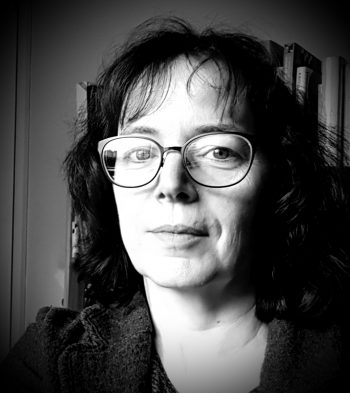
About Frances Evelyn:
Frances lives in Rutland, the smallest county in England, with her husband, two sons who are currently too old for stories and magic, and a cockerpoo who protects them from shadows.
She tells stories with a strong sense of place and of history. The Changeling Tree series, which combines time-travel, Faerie games and family saga, is embedded in the history of Leicester and the surrounding countryside. Bibliomancer imagines a sinister group meeting in the quaint market-town of Oakham.
Frances's readers enjoy her rounded characters, lively dialogue and unpredictable storylines.
What inspires you to write?
Sometimes it'll be an idea (What if fairies still existed?) or a situation (What if you really could escape into a book?) or a character's voice that comes into my head. Whatever it is, I'll mull it over for a good while before setting pen to paper. The thing that keeps me writing is readers' reviews. Much as I love writing, there'd be little point doing it if no-one enjoyed reading my books!
What authors do you read when you aren’t writing?
I love Jane Austen, which will be obvious to readers of Bibliomancer. Diane Setterfield writes beautiful historical fantasy and Neil Gaimon is fabulously creative. Among indie authors, I particularly love Shirley Gilmore, Ash Fitzsimmons and Joan I. Wendland, who write funny, moving and thought-provoking fantasy anchored in a realistic version of the real world.
Tell us about your writing process.
Once I've got a general sense of where the story is going, which is all in my head, I sit down to write. When characters start to develop a voice of their own, I sometimes find that it's not credible for them to do the things I'd intended them to do, and the story might take a different direction entirely.
I have a condition called aphantasia, which means I can't visualise my characters or settings (or anything else) in my mind, so I do have to make notes and draw diagrams and save photos to ensure that I'm consistent. For me, visual description has to add to the atmosphere or the plot in some way — I don't generally describe what my characters are wearing, for example, because it doesn't matter to me.
Once I've got a complete first draft, I take a break from it and work on something else for a while, and then go back and read it more objectively. The next stage is lots of editing — cutting out scenes and characters and whole sub-plots sometimes to make the story work, and I read everything aloud to make sure the dialogue is convincing and that the characters have distinct voices.
For Fiction Writers: Do you listen (or talk to) to your characters?
Neither, but when I'm writing, I feel as if I'm inhabiting them.
What advice would you give other writers?
You need to know why you're writing and who you're writing for. If selling lots of copies is your most important motivation, write to a formula that's already succeeding. If it's the pleasure of creativity that keeps you going, you'll have to work harder for sales.
How did you decide how to publish your books?
I self-publish on Amazon because I already had writing and publishing experience and I was impatient to get my stories out there. I know a lot more about marketing and publicity now than I did when I started!
Obviously it's better to have an agent and a big publisher, if that's possible, but publishing with a small press isn't necessarily less work or more profitable than doing it yourself.
What do you think about the future of book publishing?
I don't think the joy of reading is ever going to be lost, despite the many distractions of everyday life, though the catastrophic changes to the way English is taught in UK schools have taken a toll. All the same, once they're hooked, readers will read. E-books have made this more convenient than ever — my holiday books used to take up half my suitcase.
It seems likely that the number of published titles will continue to grow because it's so easy to self-publish. At the same time, established writers and people who are famous in other fields top the best-seller lists, and the algorithmic tides will carry on narrowing the books presented to readers. Small publishing houses may not be viable if these trends continue.
What genres do you write?: contemporary real-world fantasy
What formats are your books in?: Both eBook and Print
Website(s)
Frances Evelyn Home Page Link
Link To Frances Evelyn Page On Amazon
Your Social Media Links
Goodreads
Facebook
Twitter
Instagram
YouTube
All information in this post is presented “as is” supplied by the author. We don’t edit to allow you the reader to hear the author in their own voice.
